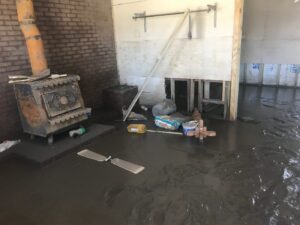Operation Heartlander’s Foxtrot Team navigated two miles down the sandy rutted lane that meandered next to a river. Their destination was a wood-sided house that sat at the lane’s end, with a small tributary of the river flanking its left side. The property belonged to Dan Steyskal, and it had filled with river water and silt six-and-a-half-feet up the walls three weeks earlier, following the March 2019 bomb cyclone. That storm, Winter Storm Ulmer, caused the worst flooding Bellevue, Neb., had ever seen. The back roof of the Steyskal house still had sand on its shingles, which had been left by the currents.
Team Rubicon Greyshirts Jack Chandler, Jim Manken, Adam Despang, and Jones inspected the grounds and the structure, then got to work shoveling thick, runny mud from a lower floor family room. Two of Steyskal’s friends arrived in work boots to assist with the muck-out, while he headed back to his temporary home. Steyskal had been at his mother’s overseeing skid steer operators; her house was on a lake and had been lost due to flooding.

The Steyskal living room.
Team Rubicon began Operation Heartlander on March 22 after Winter Storm Ulmer tore through the middle of the country, from Colorado to Michigan, delivering winds over 100 mph, blizzard conditions, and record rainfall.
The Greyshirts and spontaneous volunteers had removed everything from the family room and cleaned the tile floor of most of the mud by the time Steyskal returned, so he and the two volunteers started emptying the remaining contents from the house’s upper rooms. They made two piles: one to be sorted, the other a towering trash mound of water-logged sofas, a rusting stove, a filthy refrigerator, sopping mats and towels, and other debris.
A friend, who’d been turkey hunting but stopped to help with the cleanup, arrived and Steyskal took a break to explain that his neighbor, who Team Rubicon had assisted earlier, had introduced him to the organization. Steyskal had bought the house earlier in 2018 but hadn’t moved in, full-time, until November’s deer hunting season. “I bought it because I love fishing, and the first fish we caught out here was an 87-pound blue cat. We have a photo on YouTube of my six-year-old daughter kissing the fish before we released it,” Steyskal said, the excitement from that day still oozing from his voice.
“But now… shit,” said Steyskal, acknowledging that the house was uninsured. He was glad they’d evacuated when forecasters predicted that the river would rise 29 feet. “We put stuff high in the house and up on buckets just in case the water got high. We took most of the clothes and removed the deer meat from the freezer.” Still, the river rose beyond the 29-foot predictions.
FEMA has been by to assess the damage, but Steyskal’s still awaiting word as to what they will do. If he can get a loan and is allowed to rebuild, he said, he’ll raise the house up. The house as it was when he bought it was half on slab and half above a basement which, three weeks after the flooding, remained filled with more than five feet of murky water. He doesn’t want to be forced from his riverfront property where the fishing is so great.
As Team Rubicon wraps up its first afternoon on his property, strike team leader Chandler promises they’ll be back the next morning to demo the flooring and to take out the rest of the drywall. Steyskal promises more of his buddies will be there to help.
“I appreciate everything,” he says, before climbing up on a chair to get to his front door. The water had washed away his stairs.



